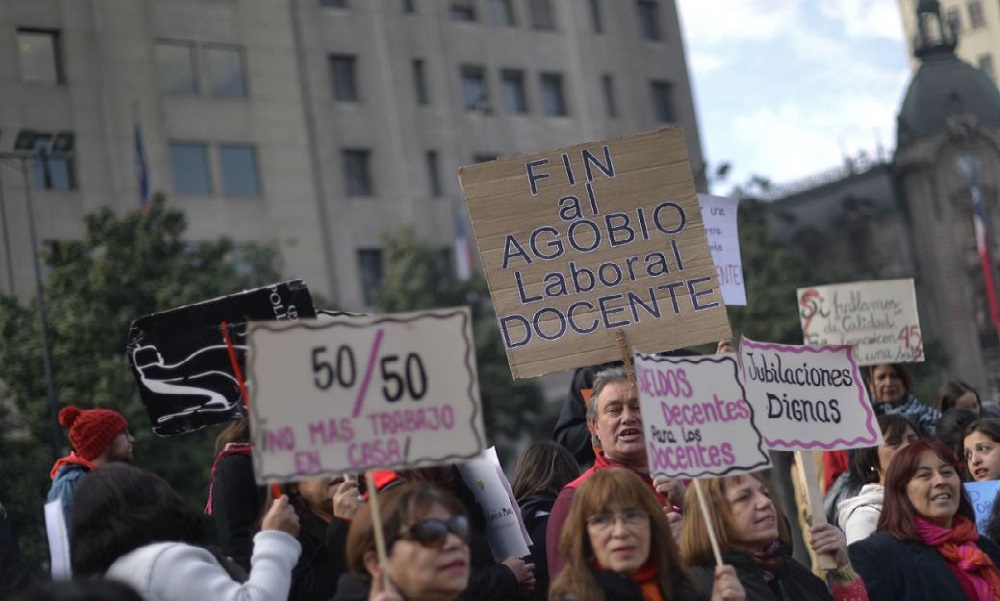La movilización que lleva adelante el gremio docente avanza hacía su 6ta semana, decisión que vino luego de una propuesta del gobierno y que el dirigente del Colegio de Profesores, Mario Aguilar, planteara que era el momento de repliegue. De esta forma el paro se constituye como una de las huelgas más extensa que ha efectuado el gremio en su historia, una característica que responde en primer lugar a la contundente adhesión que ha permitido tener postales de profesoras y profesores de todo Chile reunidos en Santiago con 50mil personas en las calles, similar convocatoria que en Valparaíso marchando 30 mil hacía el Congreso. Ambiente robustecido con diversas expresiones creativas en la protesta y de gran apoyo social.
Huelga docente, radiografía de la crisis de la educación de mercado.
Los fenómenos de la historia reciente de nuestro país han radicado en la insurgencia masiva de sectores sociales ligados a la educación, incluyen a los estudiantes durante el 2006 – 2011, docentes el 2015 y en el año pasado universitarias y secundarias en medio de la ola feminista tomaban los establecimientos educativos contra el sexismo en la educación. Todo este panorama bajo un denominador común: el modelo educativo de mercado. Por un lado siendo un negocio lucrativo al endeudar al estudiantado, mientras que desde la dictadura hasta la actualidad surge un proceso sistemático de deterioro de las condiciones laborales de las y los docentes. Es en este punto que la actual huelga tiene ciertas particularidades en sus demandas que no se limitan meramente a los aspectos salariales, un pliego que adscribe la doble evaluación,la carrera docente, el agobio laboral y la deuda histórica.A su vez, estas se acompañan por el ingreso a escena de las educadoras de párvulo y diferenciales que exigen reconocimiento a sus menciones.
La movilización encuentra su estallido en un momento que Piñera intentaba actuar con una serie de medidas sobre la educación: políticas represivas hacía les secundaries, escolarización de la enseñanza de párvulo y el cambio curricular que deja fuera la obligatoriedad de historia y ed. Física en la enseñanza secundaria. Una situación que dejaba poco espacio para sentar acuerdos con el profesorado, por lo tanto la política del gobierno fue apostar al desgaste. Sin frutos dicha política, el gobierno debió sentarse luego de 4 semanas de paralización, siendo rechazada su propuesta en una consulta nacional. En paralelo, las reacciones de las y los secundarios fueron de tomas de colegio contra las políticas represivas del Estado. Todo esto lleva a que Piñera tenga más del 70% de desaprobación.
Posibilidades, limites y propuestas.
El diagrama social del último mes lo marcó la movilización docente y la presencia de les secundaries en las calles, reacciones que enfrentan a la ofensiva de reafirmar el modelo por parte del gobierno. Esta situación tiene puntos que son necesarios remarcar, por un lado las principales federaciones universitarias las dirige el Frente Amplio, mismo sector que dirige el Colegio de Profesores, no apostaron a motorizar un gran movimiento en defensa de la educación publica que garantizara el triunfo docente. En sintonía, la dirigencia del Colegio de Profesores plantea replegar la movilización, contraria a esta posición la mayoría vota continuar movilizados.
Algunas conclusiones en medio del proceso, es que si bien el petitorio expresa demandas sentidas por el gremio, la dirigencia no ahondó en prioridades que aglutinaran a todo el profesorado, dando espacio al gobierno. El contrapunto sobre esta noción fue la voluntad movilizadora que expresó la posibilidad de amplificar una voz que cuestionara una vez más el modelo educativo, tanto por oposición creciente al gobierno en sus medidas como por la centralidad de las demandas y la efervescencia social que transita el país. Disyuntiva que sin duda traerá un gran debate en la vanguardia movilizada, por lo pronto la necesidad de la creación de alternativas dentro del gremio como a nivel político serán motor para una nueva generación que disputa en las calles.
Desde el Movimiento Anticapitalista, sección de la Liga Internacional Socialista, seguiremos impulsando la necesidad de una gran unidad educativa para enfrentar al gobierno y que la lucha de los profesores triunfe.
J.A. – Movimiento Anticapitalista




